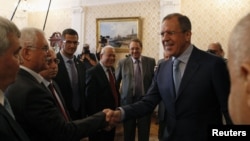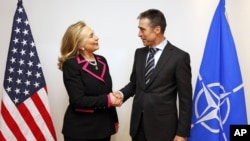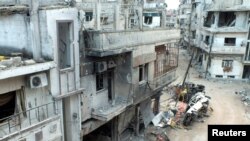MOSCOW —
As Syria’s civil war threatens the future of President Bashar al-Assad, Russia is trying to build a pro-Russian opposition force.
Inside Syria, Russian envoys are meeting opposition politicians. Two weeks from now, Russia will support a meeting in Italy of what it hopes will be a pro-Russian group: the National Coordinating Committee for Democratic Change.
In contrast, Russia will boycott a meeting in Morocco next week of Friends of Syria, a Western and Arab coalition that supports a rival group, the National Coalition of the Syrian Revolutionary and Opposition Forces.
The Kremlin is hoping to build on 40 years of military, economic and educational ties with Syria. These ties date back to 1970, when Bashar al-Assad’s father, Hafez al-Assad, seized power in a coup.
Too little, too late
But Alexei Malashenko, a regional expert for the Carnegie Moscow office, says it is too little, too late for the Kremlin to play the Russia card.
“The pro-Russian place is empty,” he said in Moscow. “The pro-Russian place is compromised by the cooperation of Moscow with Bashar. So I don’t believe so-called pro-Russian opposition is able to play a big role.”
He said that Moscow missed its chance when it failed to move aggressively at the start of the anti-Assad protests, nearly two years ago. Since then, more than 40,000 Syrians have been killed, more than 600,000 have taken refuge in neighboring countries, and about 10 percent of the nation’s population of 22 million have become internal refugees.
Officially Russia claims neutrality in the civil war, stressing that the Kremlin supports the Syrian people and not the Assad government. Russian diplomats speak against Western and Arab Gulf state military aid to Syria’s rebels.
But last week, the American investigative news organization ProPublica released documents indicating that Moscow evaded international sanctions this year and sent to Damascus 240 tons of newly printed Syrian pound banknotes. Another set of documents indicated that the Russian government is preparing to ship to Syria four freshly refurbished helicopters.
Russian officials say they are merely honoring old contracts, drawn up before the civil war started. In turn, the Kremlin charges that the West is interfering in Syria.
"Russia is not opposing Western influence or putting a stick in the spokes of Western-initiated projects out of spite," Russia’s Foreign Minister Sergei Lavrov told a defense policy council in Moscow on Saturday. "The fact is: advancing democracy through iron and blood just does not work,” he said.
This blood and iron phrase has authoritarian echoes in Europe where it was first popularized 150 years ago by Germany’s nationalist chancellor, Otto von Bismarck.
Differences with Turkey
NATO representatives meeting in Brussels Tuesday are expected to approve Turkey’s request for the placement of Patriot missile batteries on its border with Syria. The Patriots can shoot down incoming missiles or warplanes. Syria is believed to have several hundred surface-to-surface missiles capable of carrying chemical warheads.
The Kremlin is highly sensitive to the placement of missile defense systems near Russia. On Monday, Russian President Vladimir Putin flew to Turkey in a last minute attempt to dissuade the Turks.
In public, Putin only derided the Patriots as old technology, and asked Turkey to show restraint.
“We share Turkey's concern over the developments on the border,” Putin said at a joint press conference with Turkish Prime Minister Recep Tayyip Erdogan. “And we are well aware of the feelings experienced by the Turkish government and people. But we are calling for restraint."
Turkey hosts thousands of Syrian refugees in border camps and allows arms to be shipped to Syria’s opposition fighters.
Dmitry Verkhoturov, a Moscow political scientist, said that Russia opposes Turkey’s involvement in Syria’s civil war.
“Russia is very displeased with Turkey’s involvement in Syria’s affairs, especially in regards to military support of the opposition forces,” Verkhoturov said.
He said that Russia could retaliate if Turkey makes any cross-border military move to support Syria’s opposition.
Over the last two years, the Kremlin has been on the losing side of three Arab Spring revolutions - in Tunisia, in Libya and in Egypt.
Malashenko of Carnegie says that the Kremlin has a hard time backing away from its public view that the Arab Spring unrest is instigated by Western powers. This handicaps Russia’s policy in Syria, long a Kremlin ally.
“It’s a symbol of post-Soviet history,” he said recalling the legacy of decades of military, diplomatic and economic partnership. “And psychologically, it is very difficult for Putin to refuse.”
But, on the ground in Damascus, realism may be prevailing.
The Russian embassy has started to evacuate some of the thousands of Russians citizens who live in Syria. Many are Russian women who married Syrian students during the height of the Cold War alliance between Syria and the Soviet Union.
Inside Syria, Russian envoys are meeting opposition politicians. Two weeks from now, Russia will support a meeting in Italy of what it hopes will be a pro-Russian group: the National Coordinating Committee for Democratic Change.
In contrast, Russia will boycott a meeting in Morocco next week of Friends of Syria, a Western and Arab coalition that supports a rival group, the National Coalition of the Syrian Revolutionary and Opposition Forces.
The Kremlin is hoping to build on 40 years of military, economic and educational ties with Syria. These ties date back to 1970, when Bashar al-Assad’s father, Hafez al-Assad, seized power in a coup.
Too little, too late
But Alexei Malashenko, a regional expert for the Carnegie Moscow office, says it is too little, too late for the Kremlin to play the Russia card.
“The pro-Russian place is empty,” he said in Moscow. “The pro-Russian place is compromised by the cooperation of Moscow with Bashar. So I don’t believe so-called pro-Russian opposition is able to play a big role.”
He said that Moscow missed its chance when it failed to move aggressively at the start of the anti-Assad protests, nearly two years ago. Since then, more than 40,000 Syrians have been killed, more than 600,000 have taken refuge in neighboring countries, and about 10 percent of the nation’s population of 22 million have become internal refugees.
Officially Russia claims neutrality in the civil war, stressing that the Kremlin supports the Syrian people and not the Assad government. Russian diplomats speak against Western and Arab Gulf state military aid to Syria’s rebels.
But last week, the American investigative news organization ProPublica released documents indicating that Moscow evaded international sanctions this year and sent to Damascus 240 tons of newly printed Syrian pound banknotes. Another set of documents indicated that the Russian government is preparing to ship to Syria four freshly refurbished helicopters.
Russian officials say they are merely honoring old contracts, drawn up before the civil war started. In turn, the Kremlin charges that the West is interfering in Syria.
"Russia is not opposing Western influence or putting a stick in the spokes of Western-initiated projects out of spite," Russia’s Foreign Minister Sergei Lavrov told a defense policy council in Moscow on Saturday. "The fact is: advancing democracy through iron and blood just does not work,” he said.
This blood and iron phrase has authoritarian echoes in Europe where it was first popularized 150 years ago by Germany’s nationalist chancellor, Otto von Bismarck.
Differences with Turkey
NATO representatives meeting in Brussels Tuesday are expected to approve Turkey’s request for the placement of Patriot missile batteries on its border with Syria. The Patriots can shoot down incoming missiles or warplanes. Syria is believed to have several hundred surface-to-surface missiles capable of carrying chemical warheads.
The Kremlin is highly sensitive to the placement of missile defense systems near Russia. On Monday, Russian President Vladimir Putin flew to Turkey in a last minute attempt to dissuade the Turks.
In public, Putin only derided the Patriots as old technology, and asked Turkey to show restraint.
“We share Turkey's concern over the developments on the border,” Putin said at a joint press conference with Turkish Prime Minister Recep Tayyip Erdogan. “And we are well aware of the feelings experienced by the Turkish government and people. But we are calling for restraint."
Turkey hosts thousands of Syrian refugees in border camps and allows arms to be shipped to Syria’s opposition fighters.
Dmitry Verkhoturov, a Moscow political scientist, said that Russia opposes Turkey’s involvement in Syria’s civil war.
“Russia is very displeased with Turkey’s involvement in Syria’s affairs, especially in regards to military support of the opposition forces,” Verkhoturov said.
He said that Russia could retaliate if Turkey makes any cross-border military move to support Syria’s opposition.
Over the last two years, the Kremlin has been on the losing side of three Arab Spring revolutions - in Tunisia, in Libya and in Egypt.
Malashenko of Carnegie says that the Kremlin has a hard time backing away from its public view that the Arab Spring unrest is instigated by Western powers. This handicaps Russia’s policy in Syria, long a Kremlin ally.
“It’s a symbol of post-Soviet history,” he said recalling the legacy of decades of military, diplomatic and economic partnership. “And psychologically, it is very difficult for Putin to refuse.”
But, on the ground in Damascus, realism may be prevailing.
The Russian embassy has started to evacuate some of the thousands of Russians citizens who live in Syria. Many are Russian women who married Syrian students during the height of the Cold War alliance between Syria and the Soviet Union.






